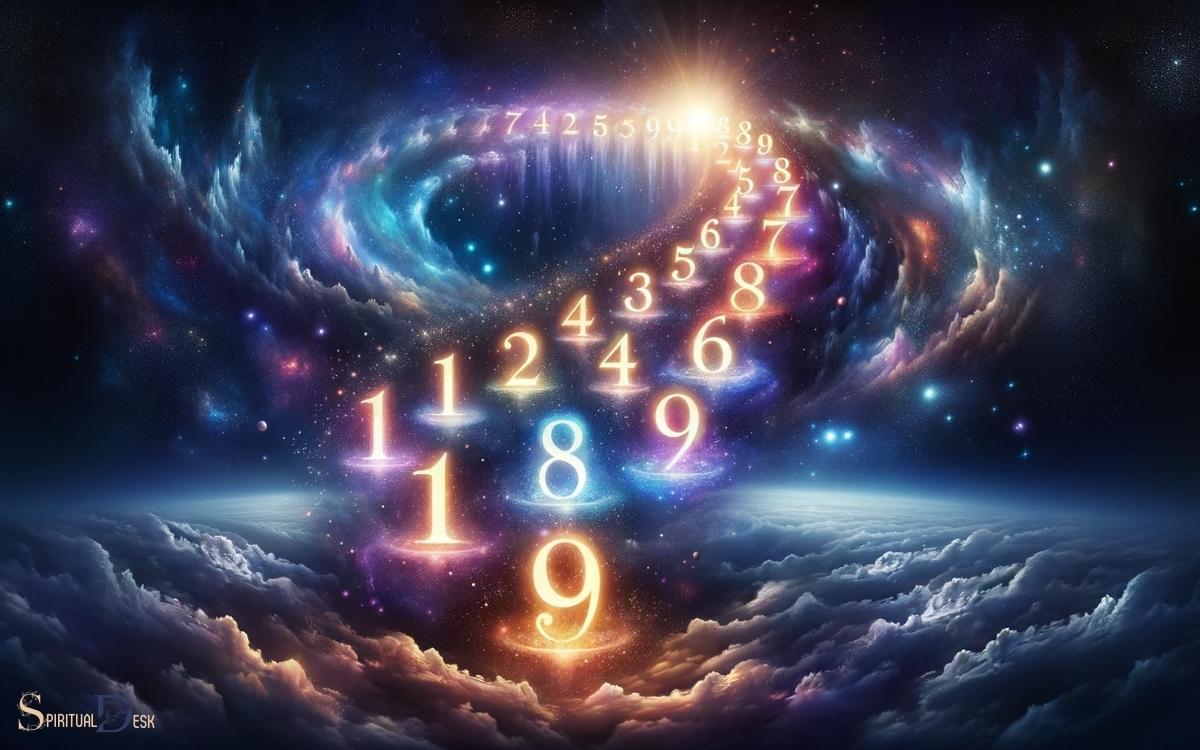What Are the Spiritual Meaning of Numbers? Divine Wisdom!
The spiritual meaning of numbers refers to the symbolic significance and mystical association of numbers with various spiritual concepts, universal energies, and divine wisdom.
Numbers have been used throughout history by different cultures and religions to represent spiritual principles and hold deeper meanings.
In numerology, the study of the mystical significance of numbers, each number is believed to possess a unique vibrational frequency that connects to specific spiritual energies and attributes.
By understanding the spiritual meaning of numbers, one can gain insight into the hidden messages and guidance from the universe.
Numerology is an ancient and powerful tool that can help individuals decipher the spiritual meaning of numbers in their lives.
By understanding the vibrational frequencies and hidden symbolism behind numbers, one can gain valuable insights into their life’s purpose, personal growth, and spiritual development.

Key Takeaway
Numbers Spiritual Meaning Chart
| Number | Spiritual Meaning |
|---|---|
| 1 | Unity, leadership, creation, and independence |
| 2 | Partnership, balance, duality, and harmony |
| 3 | Communication, expression, and creativity |
| 4 | Stability, discipline, structure, and foundation |
| 5 | Change, adaptability, and freedom |
| 6 | Responsibility, compassion, and nurturing |
| 7 | Spirituality, inner wisdom, and introspection |
| 8 | Abundance, prosperity, and authority |
| 9 | Completion, transformation, and higher consciousness |
| 11 | Master number, representing heightened intuition, spiritual insight, and a gateway to higher realms |
| 22 | Master builder, combining the energies of both 2 and 4, representing manifesting dreams into reality |
| 33 | Master teacher, representing unconditional love, spiritual wisdom, and selfless service to humanity |
The Origins of Numerology
The origins of numerology can be traced back to ancient civilizations, where numerical symbolism was deeply intertwined with spiritual and mystical beliefs.
Ancient cultures, including the Babylonians, Egyptians, and Greeks, recognized the significance of numbers in the world around them.
They observed patterns and connections between numbers and natural phenomena, leading them to believe that numbers held a deeper, symbolic meaning.
Numerology was not only used for practical purposes, such as measuring time and predicting astronomical events, but also for interpreting the spiritual and mystical aspects of life.
The belief that numbers could convey hidden truths and divine messages gained prominence and evolved into the practice of numerology as we know it today.
Understanding the origins of numerology provides insight into its enduring significance and its role in shaping spiritual beliefs across cultures.
The Power of Single-Digit Numbers
Originating from ancient civilizations, numerical symbolism has been deeply intertwined with spiritual and mystical beliefs.
Now we turn our attention to the power held by single-digit numbers. Single-digit numbers, such as 1 through 9, hold significant spiritual power across various cultures and belief systems.
Each single-digit number is believed to possess its unique energy and symbolism, influencing different aspects of life and spirituality.
For example, the number 1 signifies new beginnings and individuality, while the number 7 is often associated with inner wisdom and spiritual awakening.
Understanding the power and symbolism of single-digit numbers can provide insight into one�s spiritual path and help navigate life�s challenges.
Understanding Master Numbers
Master numbers, such as 11, 22, and 33, hold significant spiritual meaning in numerology. These numbers are believed to possess heightened vibrations and carry powerful messages from the universe.
Understanding the interpretation and guidance associated with master numbers can provide valuable insights into one�s spiritual path and life purpose.
Master Numbers Significance
Understanding the significance of master numbers is fundamental to the exploration of spiritual numerology.
Master numbers, such as 11, 22, and 33, carry a unique vibration and are considered highly powerful in the realm of numerology.
Here are some key points to consider when delving into the significance of master numbers:
- Master numbers possess intensified spiritual energy.
- They often symbolize spiritual awakening and enlightenment.
- These numbers can indicate a higher sense of purpose and potential.
- Individuals with master numbers in their numerology charts may experience greater challenges and opportunities for growth.
- Master numbers serve as a call to embrace their elevated spiritual mission and serve humanity.
As we delve deeper into the spiritual significance of numbers, it becomes evident that numerology offers profound insights into the spiritual realm and the interconnectedness of the universe.
Numerology and Spirituality
The exploration of the spiritual significance of numbers delves deeper into the realm of numerology, offering profound insights into the interconnectedness of the universe and the elevated spiritual mission of individuals with master numbers in their numerology charts.
Master numbers, such as 11, 22, and 33, hold special significance in numerology and spirituality. These numbers are not reduced to single digits in calculations as they are considered to possess a higher vibrational frequency and carry a more potent spiritual meaning.
The following table illustrates the spiritual significance of these master numbers:
| Master Number | Spiritual Significance |
|---|---|
| 11 | Illumination, intuition, spiritual awakening |
| 22 | Master builder, bringing dreams into reality |
| 33 | Master teacher, compassion, guidance |
Understanding these master numbers provides individuals with a deeper comprehension of their spiritual path and purpose.
Transitioning into the subsequent section about �interpretation and guidance�, the spiritual insights gained from master numbers can offer profound guidance in navigating life�s journey.
Interpretation and Guidance
Exploring the spiritual significance of master numbers involves interpreting and providing guidance for individuals seeking deeper understanding of their numerology charts.
Master numbers, such as 11, 22, and 33, carry powerful vibrations and unique attributes that can profoundly impact one�s spiritual journey.
When interpreting master numbers, it�s essential to consider their amplified energy and the heightened potential for spiritual growth.
Guidance related to these numbers often revolves around embracing intuitive abilities, manifesting positive outcomes, and fulfilling one�s life purpose.
Understanding the influence of master numbers can also lead to insights about inner wisdom and the development of spiritual gifts.
By delving into the interpretation and guidance of master numbers, individuals can gain valuable awareness and direction in their spiritual pursuits.
Now, let�s delve into the symbolism of repetitive numbers.
The Symbolism of Repetitive Numbers
Repetitive numbers, such as 111, 222, and 333, hold significant symbolism in various spiritual traditions and belief systems worldwide. These repetitive numbers are often interpreted as messages from the universe or spiritual guides.
In many cultures, they are seen as a form of divine communication, carrying specific meanings or guidance for those who encounter them.
For example, 111 is often associated with new beginnings, 222 with balance and harmony, and 333 with spiritual awakening.
The recognition of these repetitive numbers is believed to offer reassurance, validation, or a gentle nudge in the right direction. People who notice these patterns often feel a sense of connection to something greater than themselves.
The symbolism of repetitive numbers serves as a reminder of the interconnectedness of the spiritual and physical realms, and the influence of universal energies on our lives.
This concept ties into the exploration of numbers in sacred texts.
Numbers in Sacred Texts
The use of numbers in sacred texts holds significant spiritual meaning across various religious traditions. In this discussion, we will explore the profound implications of biblical numeric symbolism.
The presence of numerology in religious texts is another fascinating aspect to consider. Numerology is the belief in the mystical significance of numbers and their influence on human life.
Many religious texts incorporate numerological principles, adding an extra layer of depth and meaning to the text.
Furthermore, specific numbers are often assigned divine significance in sacred texts. For example, the number seven is frequently associated with perfection or completion in the Bible.
The number three is seen as a symbol of the divine Trinity in Christianity. These associations reveal the importance of numbers in conveying spiritual truths and concepts.
Understanding the role of numbers in sacred texts provides a deeper insight into the spiritual foundations of these revered writings.
By delving into the numeric symbolism and numerology present in religious texts, we can gain a greater appreciation for the rich and intricate tapestry of spiritual wisdom contained within these texts.
Biblical Numeric Symbolism
In the study of Biblical numeric symbolism, we encounter a rich tapestry of numbers with profound spiritual significance.
These numbers are not merely numerical, but are imbued with deep symbolic meanings, offering insight into the divine and spiritual realms.
Some key examples of Biblical numeric symbolism include:
- Seven: Represents perfection and completion, as seen in the seven days of creation.
- Twelve: Signifies divine authority and governance, reflected in the twelve tribes of Israel and twelve apostles.
- Forty: Symbolizes a period of testing, preparation, or judgment, as evidenced in the forty days of rain during the Great Flood.
- Three: Represents divine wholeness, as seen in the Holy Trinity.
- One: Signifies unity and uniqueness, representing the oneness of God.
These symbolic interpretations enrich the understanding of biblical narratives and teachings.
Now, let�s delve into the broader concept of numerology in religious texts.
Numerology in Religious Texts
Numeric symbolism in religious texts offers profound insights into the spiritual significance of numbers. In various religious traditions, numbers are imbued with symbolic meaning, enriching the understanding of divine truths.
- In the Christian Bible, the number seven represents completeness and perfection, as seen in the seven days of creation. The number forty signifies a period of testing or probation, evident in Jesus� forty-day fast in the wilderness.
- In Islam, the number nineteen holds spiritual significance, mentioned in the Quran as a symbol of God�s divine wisdom and power.
- Hindu scriptures contain rich numerical symbolism, with the number three representing creation, preservation, and destruction.
Understanding the numerology in religious texts provides a deeper comprehension of the underlying spiritual messages and the interconnectedness between the divine and the earthly realms.
Divine Significance of Numbers
Embedded within sacred texts, numbers carry divine significance and spiritual symbolism that illuminates deeper truths about the nature of the divine and its interaction with the earthly realm.
In various religious scriptures and spiritual traditions, numbers hold special meaning and convey profound messages to the faithful. Some examples of the divine significance of numbers in sacred texts include:
- The number 7 symbolizes perfection and completeness in many religious traditions
- The number 40 represents a period of testing, trial, or probation
- The number 12 signifies divine authority and governance
- The number 3 represents the unity of the divine trinity in Christianity
- The number 108 holds spiritual significance in Hinduism and Buddhism
These symbolic interpretations of numbers in sacred texts provide believers with a deeper understanding of spiritual principles and divine truths.
Applying Numerology to Daily Life
Utilizing numerology to interpret daily experiences can provide valuable insights into one�s spiritual journey and personal growth.
By analyzing the recurring numbers, individuals can gain a deeper understanding of the energies at play in their lives.
For example, consistently encountering the number 7 may signify a need for introspection and spiritual development, while seeing the number 11 could indicate a period of spiritual awakening and enlightenment.
Paying attention to these patterns can offer guidance in decision-making and navigating life�s challenges.
Moreover, understanding the vibrational qualities associated with specific numbers can help individuals harness the universe�s support and align with their higher purpose.
Ultimately, applying numerology to daily life empowers individuals to live more consciously and in harmony with the spiritual forces at work.
Conclusion
Numerology has deep spiritual significance and can offer insight into our lives. For example, a person constantly seeing the number 11 may be experiencing a spiritual awakening and should pay attention to their intuition and inner wisdom.
By understanding the symbolism and meaning of numbers, we can tap into the spiritual guidance and energy that they offer in our daily lives.






